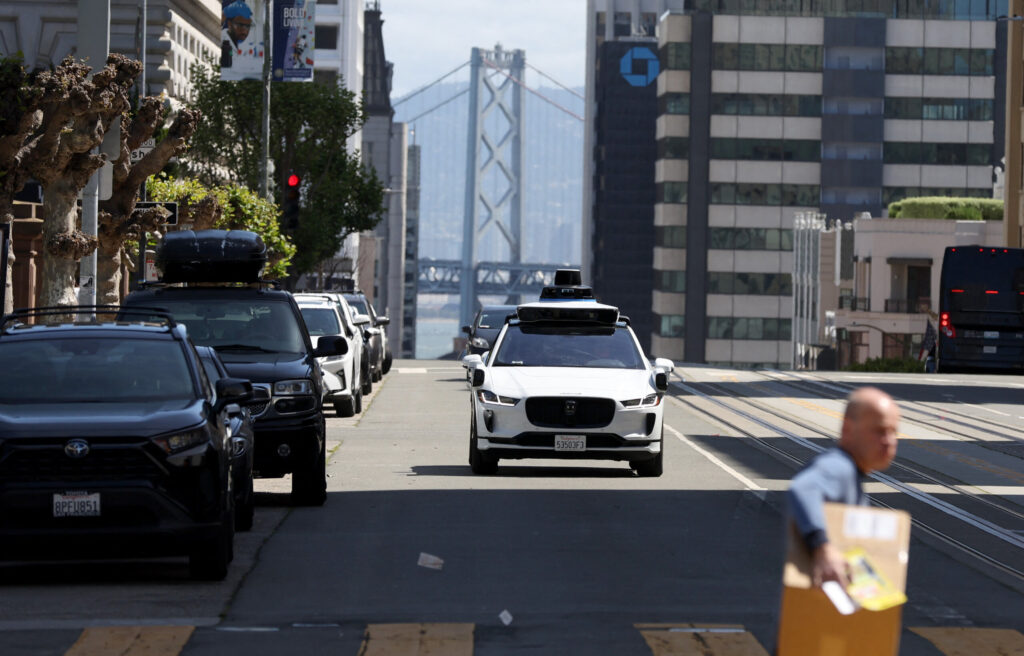Some U.S. lawmakers have called for restrictions on the operation of Chinese-made self-driving cars in the United States. Photo: SAN FRANCISCO, CALIFORNIA – APRIL 11, 2022: A Waymo self-driving car drives along a California street in San Francisco, California. San Francisco has become a testing ground for self-driving cars, with Google subsidiary Waymo and General Motors subsidiary Cruise logging millions of test miles throughout the city in 2021. Justin Sullivan/Getty Images/AFP (Photo by Justin Sullivan/Getty Images North America/AFP via Getty Images)
Some US lawmakers have called for restricting the operation of Chinese-made self-driving cars in the US, and US Transportation Secretary Pete Buttigieg has acknowledged there are concerns about the transportation technology.
When it comes to self-driving cars and the technology behind them, China has been at the forefront in recent years. As U.S. policymakers place an increased emphasis on espionage and surveillance, time may be running out for Chinese companies testing in California, the world’s largest self-driving car testing ground.
The most recent sign came from U.S. Transportation Secretary Pete Buttigieg, who told Reuters on July 20 that the Transportation Department had national security concerns about Chinese self-driving car companies in the U.S. market, after some lawmakers called for restricting their operations.
First, the prominence of Chinese-made autonomous vehicles in the U.S. is based on the California Department of Transportation’s annual report on autonomous vehicle testing in the state, released on February 17. The data shows that Chinese companies plan to continue testing their vehicles in the state through 2022, despite some policymakers voicing concerns about national security risks.
Chinese companies including Baidu’s Apollo, Pony.ai, AutoX, WeRide, Didi Chuxing, Qcraft and Deeproute.ai tested self-driving cars in California last year, logging a total of more than 450,000 test miles during the reporting period (December 2021 to November 2022). Pony.ai led the way among Chinese companies, with its test vehicles driving 280,413 miles.
Source: California Department of Motor Vehicles
It’s worth noting that Chinese AV makers did not come close to the same testing levels they did in 2021, when test vehicles drove more than 510,000 miles in California. While most AV makers reduced their testing in California compared to the previous year, WeRide and Apollo increased their testing numbers in 2021.
A self-driving car branded by Chinese self-driving startup WeRide is undergoing test drives at the company’s San Jose headquarters campus in California’s Silicon Valley.
Chinese self-driving car makers including Inceptio, NIO and XPeng have permission to test vehicles in the state, but records show they did not conduct any tests last year.
What are the issues with Chinese-made self-driving cars in America?
Concerns that self-driving cars could be weaponized date back to 2017, when advances in self-driving technology appeared to be outpacing regulators’ ability to keep up. Since then, local and national governments have grappled with when and under what conditions to allow self-driving cars on the roads.
By the end of last year, lawmakers were worried about Chinese-made cars processing huge amounts of data taking over American roads. In a Nov. 18, 2022 letter to the National Highway Traffic Safety Administration, Rep. August Plueger asked whether Washington was prepared for the security threat posed by a coming influx of Chinese-made intelligent and self-driving vehicles.
“I remain concerned that the lack of U.S. oversight of AV technology opens the door for foreign countries to spy on U.S. territory because Chinese companies could potentially transfer sensitive data to the People’s Republic of China,” Pflueger wrote. He called on regulators to explain how they have vetted the national security risks posed by these Chinese companies.
In a separate letter to Buttigieg and Commerce Secretary Gina Raimondo on July 17 earlier this year, a bipartisan group of four senators called for an investigation into the spread of Chinese-made AV technology in the US and ways to limit it.
“Technologies used in AVs, LiDAR, RADAR, cameras, AI, and other advanced sensors and semiconductors could all be used to collect data on U.S. citizens and infrastructure that could be shared with China and ultimately the Chinese Communist Party (CCP),” the lawmakers wrote. As with their November 2022 letter, in this July letter the lawmakers shared similar concerns about the testing of autonomous vehicles and devices in the United States.
“We have concerns about telecommunications, TikTok, transportation technology, whether it’s hardware or software,” Buttigieg told Reuters in response to the letter he received.
What does the future hold for Chinese AV companies in the US?
Many US lawmakers argue that China could use autonomous and connected cars as a way to integrate its systems and technologies into US infrastructure. So far, the US and most of its allies have already banned the Chinese giant Huawei from building 5G infrastructure. So the next frontier in the US-China war is definitely the “next-generation” vehicles.
Frankly, the U.S. isn’t the only one with worries. China itself has had misgivings about U.S.-made smart cars and electric vehicles. For example, early last year, Beijing, in the midst of a meeting of high-ranking Communist Party officials, imposed strict restrictions on where Teslas could operate, especially around military facilities.
Chinese companies developing self-driving cars are still taking full advantage of California’s relatively loose regulations and testing permits, but the coming years could be tough for Chinese self-driving car companies in the U.S. given growing fears about Chinese espionage.

